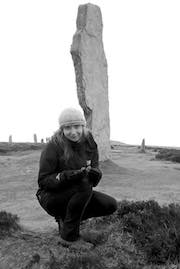Early Career Case Study: Dr Suzi Richner
Tell us about your background. Where are you from and what did you do before you joined the Department of Environment and Geography?
I’m from Suffolk originally, but I did my undergraduate degree and PhD at York. Since then I’ve actually moved out of academia and around the country before I returned to academia last year and came back to the University of York earlier his year.
My doctoral research examined palaeoenvironmental (primarily pollen) and archaeological evidence for human activity in the French Alps, with the aim of understanding past human-environment interaction. It is this cross-disciplinary focus on both people and the environment that I have partly returned to in my current role.
In between my times in York, I have worked in communication/engagement roles with National Trust and Worcestershire Wildlife Trust. I also worked in industry for two years as a Senior Environmental Archaeologist, specialising in pollen analysis, for Worcestershire Archive and Archaeology Service. During this time I was also released part-time to undertake a post-doctoral position at Cardiff University on an ERC-funded project ‘The Times of Their Lives’, focussing on the chronologies of pollen sequences from southern Britain and whether the environmental change that we see in pollen diagrams would have been discernible to people at the time.
Why did you decide to become an Early Career Researcher in the Department of Environment and Geography?
I’ve always been interested in the relationship between people and the environment in which they live, both today and in the past. When I was at York before, I was based in the Department of Archaeology. However, with there being such a large focus on the environment in the wider project, it made sense to split my role across the two departments, but I’m primarily based in the Department of Environment and Geography at the moment
Although my research can easily sit within either department until now I’ve tended to be more archaeologically-focused. Therefore it’s proving to be a really good experience for me to understand how the Department of Environment and Geography operates, and it really allows for an interdisciplinary approach to be applied to both my research and the project as a whole.
Tell us about your research. What do you currently work on and how are you funded?
I’m currently funded for two years to work on the ERC-funded project ‘The Archaeology of Agricultural Resilience in Eastern Africa’. It is primarily a liaison/communication role, whereby it is assessing how archaeological and palaeoecological information from eastern Africa can be used in discussions and within the policy-making arena by communities, NGOs, and national and international governing bodies, particularly in relation to current issues of environmental and agricultural sustainability and resilience.
I am also involved with projects looking at past and present perceptions of woodland in the UK, the archaeology and palaeoecology of the Himalaya region of Nepal and an INSTAR project in south-east Ireland looking at the chronology of pollen sequences from the Iron Age.
What part of your work do you like best?
Meetings with cake, and travel.
On a more serious note, I really enjoy the interdisciplinary nature of my work. Being able to see how one field can inform another is extremely satisfying. Not only that, but also seeing how the research process and the application of the research can engage and inform other sectors, both local communities and policy making, and vice versa, is really rewarding.
What piece of advice would you share with other Early Career researchers?
Think outside the box and always be open to communicating your research beyond your normal channels/discipline/sector. This not only helps to facilitate interdisciplinary and cross-sector working, but it can potentially help you to demonstrate impact; and more importantly it really helps to broaden networks that you might want to draw on in the future, especially for creating new collaborations, research proposals or for applying for your next position.

